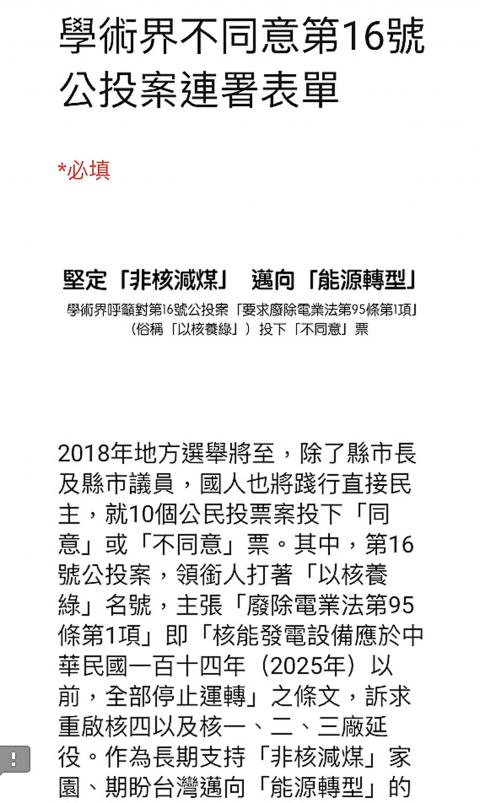Forty-eight academics yesterday launched a petition against a referendum that aims to scrap the government’s policy of achieving a “nuclear-free homeland by 2025,” collecting more than 200 signatures from colleagues on the first day.
Among the initiators were Academia Sinica academicians Lin Ming-chang (林明璋) and Lin Chang-shou (林長壽), National Chung Hsing University environmental engineering professor Tsuang Ben-jei (莊秉潔) and National Taiwan University geoscience professor Chen Wen-shan (陳文山).
The referendum, one of several to be held alongside the Nov. 24 elections, asks voters if they agree with abolishing Article 95-1 of the Electricity Act (電業法), which stipulates that all of Taiwan’s nuclear power generation facilities should be decommissioned by 2025.

Photo: Lin Hsiao-yun, Taipei Times
The petition’s organizers citied the risk of a nuclear plant disaster and environmental problems associated with the disposal of nuclear waste in urging people to vote against the referendum.
Regarding the referendum advocates’ call for resuming the construction of the Fourth Nuclear Power Plant in New Taipei City’s Gongliao District (貢寮), the petition organizers wrote that the proposal was not feasible, as the plant’s construction involved more than 500 infringements by Taiwan Power Co (台電) and cost nearly NT$300 billion (US$9.76 billion at the current exchange rate) before it was mothballed in 2015.
Nuclear plants in Taiwan face higher levels of risk and are costlier to operate than those in other nations, as Taiwan sits on active fault lines and is more likely to experience flooding and tsunamis, they wrote.
The referendum advocates proposed that 20 percent of the nation’s electricity be generated from nuclear power, 40 percent from coal, 30 percent from gas and 10 percent from renewable sources, which the petition organizaers said would not help curtail air pollution as the advocates have claimed.
The petition organizers also said it would be dangerous to have 20 percent of power generated from decades-old nuclear plants and the poorly built Fourth Nuclear Power Plant.
Nuclear energy would leave behind nuclear waste for future generations to take care of, the petition organizers said.
The petition calls on policymakers to devote the nation’s limited resources to developing renewable energy sources, instead of nuclear and coal-fired facilities.

INVESTIGATION: The case is the latest instance of a DPP figure being implicated in an espionage network accused of allegedly leaking information to Chinese intelligence Democratic Progressive Party (DPP) member Ho Jen-chieh (何仁傑) was detained and held incommunicado yesterday on suspicion of spying for China during his tenure as assistant to then-minister of foreign affairs Joseph Wu (吳釗燮). The Taipei District Prosecutors’ Office said Ho was implicated during its investigation into alleged spying activities by former Presidential Office consultant Wu Shang-yu (吳尚雨). Prosecutors said there is reason to believe Ho breached the National Security Act (國家安全法) by leaking classified Ministry of Foreign Affairs information to Chinese intelligence. Following interrogation, prosecutors petitioned the Taipei District Court to detain Ho, citing concerns over potential collusion or tampering of evidence. The

NEGOTIATIONS: The US response to the countermeasures and plans Taiwan presented has been positive, including boosting procurement and investment, the president said Taiwan is included in the first group for trade negotiations with the US, President William Lai (賴清德) said yesterday, as he seeks to shield Taiwanese exporters from a 32 percent tariff. In Washington, US Trade Representative Jamieson Greer said in an interview on Fox News on Thursday that he would speak to his Taiwanese and Israeli counterparts yesterday about tariffs after holding a long discussion with the Vietnamese earlier. US President Donald Trump on Wednesday postponed punishing levies on multiple trade partners, including Taiwan, for three months after trillions of US dollars were wiped off global markets. He has maintained a 10 percent

TRADE: The premier pledged safeguards on ‘Made in Taiwan’ labeling, anti-dumping measures and stricter export controls to strengthen its position in trade talks Products labeled “made in Taiwan” must be genuinely made in Taiwan, Premier Cho Jung-tai (卓榮泰) said yesterday, vowing to enforce strict safeguards against “origin laundering” and initiate anti-dumping investigations to prevent China dumping its products in Taiwan. Cho made the remarks in a discussion session with representatives from industries in Kaohsiung. In response to the US government’s recent announcement of “reciprocal” tariffs on its trading partners, President William Lai (賴清德) and Cho last week began a series of consultations with industry leaders nationwide to gather feedback and address concerns. Taiwanese and US officials held a videoconference on Friday evening to discuss the

PERSONAL DATA: The implicated KMT members allegedly compiled their petitions by copying names from party lists without the consent of the people concerned Judicial authorities searched six locations yesterday and questioned six people, including one elderly Chinese Nationalist Party (KMT) member and five KMT Youth League associates, about alleged signature forgery and fraud relating to their recall efforts against two Democratic Progressive Party (DPP) legislators. After launching a probe into alleged signature forgery and related fraud in the KMT’s recall effort, prosecutors received a number of complaints, including about one petition that had 1,748 signatures of voters whose family members said they had already passed away, and also voters who said they did not approve the use of their name, Taipei Deputy Chief Prosecutor